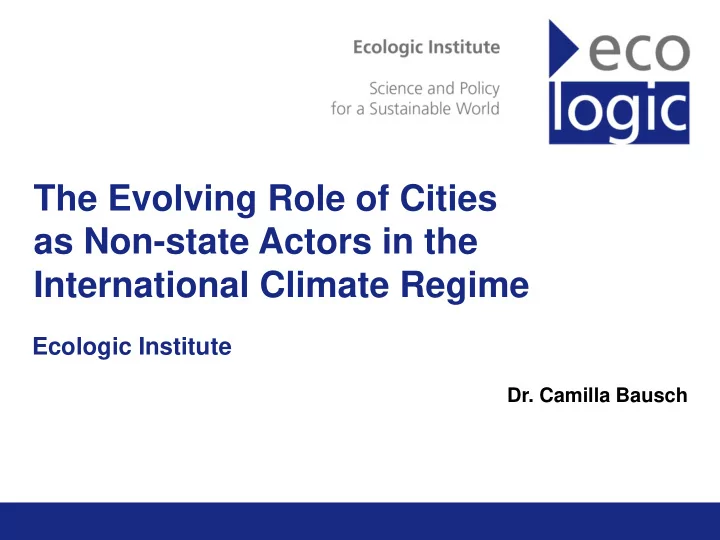

Ecologic Institute ecologic.eu The Evolving Role of Cities as Non-state Actors in the International Climate Regime Ecologic Institute Dr. Camilla Bausch
Ecologic Institute ecologic.eu Ecologic Institute- Science & Policy for a Sustainable World • Not-for-profit think tank , founded 1995 • Environmental research, policy analysis and advice • International, interdisciplinary team of about 130 people • Offices: Berlin, Brussels, Washington • Independent, non-partisan CIDOB, Barcelona, November 2018 2
Ecologic Institute ecologic.eu Overview 1. Why are Cities relevant in the Context of CC? 2. Cities in the International Climate Regime – Milestones und Changing Roles 3. What do Cities do? 4. Conclusions CIDOB, Barcelona, November 2018 3
Ecologic Institute ecologic.eu Why Cities? Because they are major emitters CIDOB, Barcelona, November 2018 4
Ecologic Institute ecologic.eu Why Cities? Because they need to adapt Source: PBL Netherlands Environ- mental Assessment Agency 2018 CIDOB, Barcelona, November 2018 5
Ecologic Institute ecologic.eu 1.5° IPCC Report confirms this • 2°C = greater risks to urban areas than 1.5°C • risks depend on vulnerability of location (coastal?), sectors (energy, water, transport), levels of poverty & mix of formal / informal settlements. • Action needed on adaptation & mitigation • Green infrastructure can be more cost effective than conventional infrastructure • limited literature on the risks of warming of 1.5°C and 2°C in urban areas CIDOB, Barcelona, November 2018 6
Ecologic Institute ecologic.eu Cities have an increasing visibility... Bali Action Plan = Kyoto mandate to Kyoto 1 st UNFCCC UNFCCC negotiate Protocol Protocol adopted in force COP treaty in force adopted 1992 1994 1996 1998 2000 2002 2004 2006 2008 Local Climate Alliance establishment of the Government + Cities for Local Government & Start of C40 Climate Climate Municipal Authorities Roadmap Protection + (LGMA) Constituency Energy Cities = parallel = observer status founded process = access = transnational networks w/ climate focus CIDOB, Barcelona, November 2018 7
Ecologic Institute ecologic.eu “regulatory” vs“catalytic & facilitative … in climate negotiations regime” Paris Paris IPCC 1.5° report, Copen- Durban Agreement Agreement COP24 Katowice hagen mandate in force adopted 2010 2011 2012 2013 2014 2015 2016 2017 2018 NPA = 4th Pillar; „ Cities LPPA & first dialogue of local CitiesIPCC Cities Day“announced / NAZCA Paris decision & leaders with COP and Climate Platform = NDCs recognize endorsed by presidency Change Science key importance of Secretariate & Conference outcome & action by NPAs & Presidency;; introduce new soft visibility ADP workshop elements on urbanisation;; Today: Friends of Cities“ 9k cities CIDOB, Barcelona, November 2018 8
Ecologic Institute ecologic.eu Local level important for climate action Perception of Role of Non-party Actors in the context of Paris Source: International Negotiations Survey 2018 CIDOB, Barcelona, November 2018 9
Ecologic Institute ecologic.eu Examples of mitigation commitments of cities Cities Influencing Respective design Main dimensions Berlin Bogota Denver Sydney Kempten factors elements 2016 2015 2015 2013 2017 Political support Broad in flux Broad Broad Broad Political commitment Stakeholder involvement Extensive Limited Extensive Extensive Extensive Long-term stability Legal bindingness Legal framework Yes No No No No Adjustment option Limited Limited Yes Limited Yes Adaptability foreseen (main targets) Long-term target defined Yes (2050) Yes (2050) Yes (2050) Yes (2050) Yes (2050) Strength of the Yes No No No No Target enshrined in law target Interim milestones, 2020, 2025, 2030, 2020, 2030 2020 No 2030 2038 budgets Transformational Monitoring & potential Yes Foreseen Yes Yes Yes evaluation process Implementation stringency Progress gap mechanism Yes Foreseen Partially Yes Yes Policies included or specific policies, specific policies & specific policies & Policy impact process in the law Yes limited process a process process process for defining them Institutional New institutions with Overarching factor Yes Yes Yes Yes staff capacity set-up distinct mandates Duwe et al., Paris compatible governance, Ecologic Institute, 2017 CIDOB, Barcelona, November 2018 10
Ecologic Institute ecologic.eu Conclusions: Cities in the context of the PA -Cities strongly effected by cc = genuine interest in mitigation/adaptation -Within limits, cities can contribute to mitigation & adaptation efforts -The failure in Copenhagen and e.g. negative stance of Trump propelled interest in non-state actors to boost action, credibility, acceptance and global engagement - Increasing visibility of non-state actors in climate regime w/ increasing opportunties to contribute, but are not parties (who negotiate/vote/set the agenda ) = „hybrid multilateralism “ and „ polycentric approach to climate governance “? -To achieve PA goal (temperature rise well below 2°C) city action needed - Cooperation w/ party actors in climate regime might be less important than the cooperation w/ other cities or w/ national gov‘t /legislator (pressure) - Transparency: Monitoring, reporting, compliance and risk of double counting with respect to mitigation efforts remains a challenge CIDOB, Barcelona, November 2018 11
Ecologic Institute ecologic.eu Thank you very much! Ecologic Institute Pfalzburger Str. 43/44 10717 Berlin Dr. Camilla Bausch Germany Tel. +49 (30) 86880-0 ecologic.eu CIDOB, Barcelona, November 2018 12
Recommend
More recommend